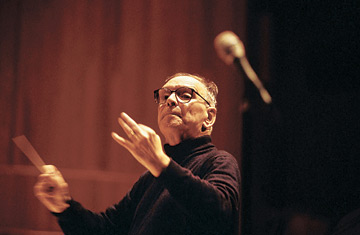
Barbican on Oct. 3, 2001.
Three tough guys stare daggers at one another in the prelude to a triangular gunfight. A pioneer woman carries water to men laying tracks for a railroad. A Jesuit priest contemplates a South American waterfall. G-men pursue gangsters across a bridge. A boy peeks through a projection-booth window to see a movie or through a keyhole to watch a beautiful woman slowly undress before her mirror.
Each of these images--from The Good, the Bad and the Ugly, Once Upon a Time in the West, The Mission, The Untouchables, Cinema Paradiso and Malèna--has its own meaning and feeling. But if, during these movies, you feel an elevation of spirit or tension, it's because you've fallen under the spell of Ennio Morricone's music.
Every fan of spaghetti westerns knows Morricone, at least by ear. And every Metallica fan: the band has used his theme from The Good, the Bad and the Ugly to open its concerts for decades. On the new CD We All Love Ennio Morricone, his music is covered by artists from Bruce Springsteen to Yo-Yo Ma, Céline Dion to Quincy Jones. The Film Forum, Manhattan's top rep house, is mounting a three-week Morricone tribute. At 78, this preposterously prolific composer (the Internet Movie Database lists 505 film and TV scores) is the music man of the hour.
And on Feb. 25, the Motion Picture Academy will give the man an honorary Oscar "for his magnificent and multifaceted contributions to the art of film music." That sounds florid, but it's almost faint praise, since Morricone has done more than dream up some of the most ravishing melodies of the past half-century. He kicked new life into film composing, blending pop and symphonic elements into metamovie music.
Born in Rome, the son of a trumpet player, Morricone studied composition at a conservatory but earned his early money as an arranger of Italian pop. As he notes in the 1995 documentary Ennio Morricone, it was one such chart--a raspy, twanging version of Woody Guthrie's Pastures of Plenty for U.S. singer Peter Tevis--that director Sergio Leone asked be adapted for his new western. Remove vocal, add whistling, rev up the guitar volume, and you have the theme for A Fistful of Dollars. This worldwide hit made the careers of Leone, Morricone and the obscure actor who played the Man with No Name. A guy called Clint Eastwood.
From the start, Morricone used eccentric instrumentation--not just humble toys like the harmonica and ocarina and panpipes but typewriters and tin cans--that, coupled with his profligate melodic gift, gave his films a gorgeous dissonance.
Most directors want a film's score to be subtle, the secret ingredient in movie emotions. Morricone wants his music to be as evident as the performances and the visuals. There's simply no ignoring the chorale he composed for the rebel peasants' march in Gillo Pontecorvo's Queimada (Burn!) or the several stirring anthems he wrote for Bernardo Bertolucci's 1900. These are pieces that, as Morricone proved when he played them at a concert this month at New York City's Radio City Music Hall, can stand and soar on their own.
